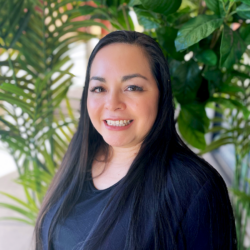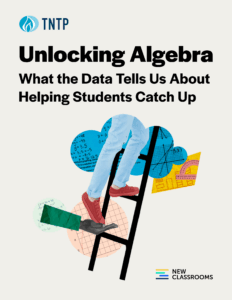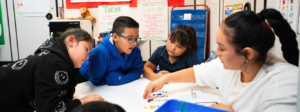When the COVID-19 pandemic arrived in March 2020, it not only threw our healthcare system into a frenzy, it also disrupted our nation’s educational system. As classrooms sat empty, educators were frantically trying to figure out how to provide quality instruction over virtual platforms while school leaders had the task of supporting teachers with new technology and virtual professional development. “We had to figure it all out. It was all happening at once and we were in the throes of it,” said Kendra Moreno, program manager for the Office of the Maricopa County School Superintendent (MCSS).
Moreno is no stranger to education. A life-long educator, she’s been at the head of the class as a teacher and leading the way as a principal. A native of Arizona, Moreno transitioned to the MCSS, which is led by Superintendent Steve Watson, where she helps to facilitate grants that support school districts in Maricopa County.
As the weeks went by, Superintendent Watson foretold the inevitable. “He said, ‘when school goes back, things will never be the same.’ And he was right,” Moreno reflected. Learning from home posed many challenges, and each child’s situation was different. Some had a desk at home while others “Zoom-ed” in from bed. Some had grandparents or other family members at home helping to keep students focused on the lesson while others had little or no adult authority. Some students had inconsistent Internet access, or even struggled to find enough food. Indeed, things would never be the same.
As Moreno and her colleagues were faced with these challenges, she stopped to think, “I wonder what TNTP has to say about all this?” Throughout Moreno’s tenure at MCSS, she had become familiar with TNTP’s research and guidance. From The Opportunity Myth to other publications, she had witnessed our strategy and framework in her previous grant projects.
A month after the students were sent home, TNTP released our initial recommendations about how school systems should respond to the pandemic. TNTP’s message resonated with Moreno and was familiar. “TNTP said the same thing, ‘School will never be the same again. And when we go back, there will be gaps due to learning loss.” Facing this reality, MCSS started to prepare and formed the Learning Acceleration Task Force with the goal of supporting both teachers and students.
The group turned to TNTP’s free online resources—the COVID-19 School Response Toolkit and Learning Acceleration Guide—to understand what was needed. “We were learning what learning acceleration was. No one really knew at that moment. We used TNTP’s guidance to understand the difference between learning acceleration and remediation,” Moreno said.
Armed with TNTP’s resources and research, and needing a solution for a COVID-19 response, Moreno was inspired to write a grant proposal. The overall goal was twofold: 1) accelerate academic success via learning acceleration and 2) stabilize the educator workforce.
While the team was aligned with TNTP’s strategy, they also recognized that teachers were working under unprecedented circumstances and needed assistance in implementing learning acceleration. To do this, they created a learning acceleration specialist position. “We wanted a team in the field to be extra hands and feet—to help be a thought partner and help teachers to accelerate learning. After a few cycles with a learning acceleration specialist, they would have the tools and tactics to implement it on their own,” she said.
The profile for the learning acceleration specialist is one of a master teacher who has proven classroom experience and success with student learning rather than operating like a coach. While a coach goes into the classroom, observes, provides guidance and leaves, the learning acceleration specialist stays present in the classroom with the teachers.
The learning acceleration specialists are assigned to four to five teachers at a time and are responsible for co-planning and co-teaching with classroom educators to develop teacher capacity to implement learning acceleration strategies. “We are right there with them. Taking the standard, unpacking the standard, identifying the pre-requisite skills, assessing students and designing and delivering instruction,” she added. “We can address student needs right then and there, in the moment.” In this model, both the teacher and the learning acceleration specialist can look at student work together, collaborate, and help students access grade-level content without delay
The planning and efforts of Moreno and the Learning Acceleration Taskforce paid off. The team was awarded a two-year $9.9 million grant in Elementary and Secondary School Emergency Relief (ESSER) Funds to implement their own learning acceleration program. In addition to a data management system that houses a Learning Library full of learning acceleration materials and professional development resources, the grant funds 19 learning acceleration specialists to implement the program in six of the 58 school districts with the support of MCSS.
They were funded in April 2021 and by May started hiring the learning acceleration specialists. They held a nine-day training in July and the learning acceleration specialists were working in the field before school started fall 2021. How was the program received?
“Overall, the response has been positive from school and district leadership because learning acceleration is aligned to their vision of strong Tier 1 instruction for all students. We didn’t want to represent a change initiative,” Moreno said. At the classroom level, the learning acceleration specialists and teachers have worked hard to develop the kind of trusting relationships needed to work closely in this capacity. We are seeing teachers successfully employ the scaffolds and supports for their students to access grade level content during and even beyond their cycles with a learning acceleration specialist.”
Preliminary data shows success for the learning acceleration program. Already, 80 coaching cycles have been completed. In half of the cycles, 80 percent of the students mastered the goal. “We are seeing growth, but we are working towards mastery,” Moreno said.
Once the grant ends in 2024, the goal is to have built a sustainable program. From district to district, Moreno and her team are identifying sustainable approaches and the teacher leaders who will keep learning acceleration practices and mindsets going beyond the grant. The hope is that there will be future funding and opportunities to expand the Learning Acceleration Partnership to additional districts across the county.
What’s next for TNTP’s journey with Maricopa County? We continue to provide our insight, collaboration, and expertise with the team. In addition to joining them in one of their professional development sessions for the learning acceleration specialists, we most recently co-presented on this work at the Every Student Succeeds Act (ESSA) Conference hosted by the Arizona Department of Education. We are continuing to explore ways to grow this partnership and learn from one another.
For more information on the Learning Acceleration Partnership, click here.








